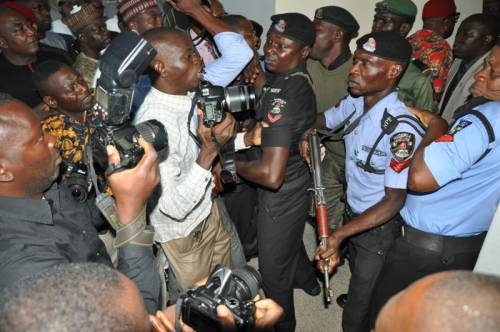Media practitioners who have been in the forefront of reporting attacks and facilitating access to justice for victims of human rights abuses have also been under attack under a democratic rule, without getting justice for such attacks.
Media Rights Agenda, MRA had reported that a minimum of 17 journalists have been killed in the last 22 years and several others have suffered one form of victimization or the other, either in the line of duty or as a result of their work.
Of major concern is that in all of the assassination cases, there has been no single instance where an effective investigation has been conducted and the perpetrators arrested, prosecuted, jailed or punished for their crimes.
READ ALSO – https://bonewssng.com/nigerian-media-environment-is-increasingly-hostile-rights-activist-edetaen-ojo/
To address this menace and provide opportunities for media practitioners to access justice and keep safe, MRA held a twitter chat with the theme, “Ensuring Safety of Journalists”, with Chioma Phibe Nwaodike, Head of MRA’s Legal Department; Morisola Alaba and Sideeq Rabiu Legal Officers at MRA as discussants.
Moderating the tweet chat, Idowu Adewale, MRA’s Communications Officer noted that, perpetrators in all the 17 cases of assassination of journalists did so with impunity as they went scot free, adding that, “this atmosphere sends a wrong message to the perpetrators that they can kill journalists and have no adverse consequences.”
He also noted that, “attacks on the media, particularly the killing of journalists, have escalated during the period of civilian democracy, far above the levels recorded during the military regime.
“In virtually all cases, law enforcement & security agencies have never been able to investigate the killings or hold anyone accountable for these crimes despite the obligation that the Government has to protect all citizens, including media professionals.”
Adewale thereafter recommended that, “an important remedy to these continued impunities to crimes perpetrated against journalists and media workers is to challenge these crimes through litigation rigorously.”
Responding, Chioma Nwaodike, MRA’s Legal Officer affirmed that, “in the context of the safety of Journalists, litigation is the preferred method as it offers a clear outcome as court judgments clarify issues, counter speculations and false or inaccurate information.”
Nwaodike however noted that cost could be a major deterrent for journalists to seek litigation, but revealed that, “MRA typically provides a cheaper path to litigation and in many circumstances, provides pro bono services to journalists, and media workers attacked while performing their duties, making litigation a more cost-effective option.”
She assured that, “a journalist will always get a result when engaged in litigation (whether he/she likes the result is, of course, another matter). However long it takes, there will be a result. Litigation is the last and most conclusive hope for attacks against journalists.”
Speaking on hindrance to litigation as a way of ensuring safety of journalists, Morisola Alaba, Legal Officer at MRA, revealed that, “the willingness of the media organization where an attacked journalist works can also be a challenge for the journalist in question to institute an action in Court. In some cases, the media organization where the journalist works is not ready to take legal action against the attack on behalf of the journalist.
“Economic consideration, especially fear of loss of revenue due to advert withdrawal can also induce a media organization to prevent its reporters from instituting cases of attacks in court. Again, the fear of being further attacked by perpetrators of this crime is also a hindrance to litigation.”
She mentioned categorically that, “many times we see cases of journalists giving their authorization to litigate on their behalf and later turn around to revoke the authorization out of fear, intimidation or bribery.”
Alaba advised journalists to seek support from MRA to institute an action in court to seek redress for attacks against them, stressing that, “Journalists attacked because of or in the course of their works can reach out to MRA for litigation support with no financial cost to them. Such journalist can send an email to mra@mediarightsagenda.org”
On his part, Sideeq Rabiu, Legal Officers at MRA, tasked the Federal Government to “live up to its international treaty obligation to guarantee the safety of journalists and other media workers, including by preventing attacks on them whenever possible.
“In striving to meet its obligation to protect journalists and other media workers, the Federal Government should ensure that all attacks on journalists and other media workers are investigated and that the perpetrators of the attacks are prosecuted and punished,” he added.
Rabiu advised legal practitioners to “get involved in using their expertise to protect and defend journalists and other media workers who are attacked for their work and should avail themselves of opportunities, which enable them to stay up to date and deepen their knowledge and understanding of issues relating to the safety of journalists and thereby enhance their expertise on the subject.”
READ ALSO – https://bonewssng.com/endsars-west-african-lawyers-seek-to-help-journalists-that-were-attacked/
He also noted that “Media organizations have a responsibility to ensure the safety of journalists and other workers in their employment and should accordingly conduct periodic and regular safety training for them so that they can do their work safely and professionally.
“Media organizations should provide journalists and other workers in their employment with appropriate equipment, such as protective gear, where necessary, to prevent or minimize their exposure to various hazards that they may confront in the course of their work.”

